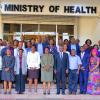Dr. Diana Atwine warns about the impending threat of Antimicrobial Resistance (AMR) to Uganda’s public health
13 Oct 2023
Speaking at this year's National Laboratory performance review meeting, Dr. Atwine emphasized the gravity of the AMR crisis by likening it to a time bomb set to detonate and affect us all.
This warning came in response to a presentation by Dr. Saudah Namubiru, a microbiologist affiliated with the National Health Laboratory and Diagnostic Services (NHLDS). Dr. Namubiru's presentation shed light on alarming trends in Uganda's resistance rates to various categories of antibiotics, including Access antibiotics, watch antibiotics, and last resort antibiotics. This was derived from the AMR surveillance conducted by NHLDS to guide clinical decisions and promote ethical and evidence based prescriptions as part of the Laboratory agenda. The worrying aspect of this trend is that if not addressed, it has the potential to render the first line of antibiotics ineffective.
Dr. Namubiru's findings further revealed that, on average, two antibiotics were prescribed per patient during the study, with a striking 64% of patients receiving antibiotics at every medical encounter. Even more concerning was the fact that only 40% of these prescriptions adhered to treatment guidelines and protocols, while a mere 1% of prescriptions were based on culture and sensitivity results.


In response to these alarming findings, Dr. Namubiru urged for the implementation of several key strategies outlined in the National Action Plan on AMR. These strategies include:
Promotion of Public Health Awareness, Training, and Education: Raising awareness among the general public, healthcare professionals, and policymakers about the dangers of AMR and the responsible use of antibiotics is essential.
Optimization of Antimicrobial Use: Encouraging healthcare providers to use antimicrobial medications judiciously and in accordance with clinical guidelines to prevent overuse or misuse.
Improving Infection Prevention and Control: Strengthening measures to prevent the spread of infections in healthcare settings and the community.
Strengthening Knowledge and Evidence Through Surveillance: Enhancing the monitoring and collection of data related to AMR to inform evidence-based interventions.
In her address, Dr. Atwine, the Permanent Secretary Ministry of Health, reiterated the urgency of addressing AMR as a pressing public health threat that spares no one. She emphasized the need for collective action and cooperation among all stakeholders, stating that tackling this issue requires the involvement of clinicians, regulators, laboratories, policy makers, and the general public. Dr. Atwine underscored that AMR is a problem that transcends individual sectors and institutions, and that concerted efforts are vital to avert its potential catastrophic consequences.
“The issue of Antimicrobial resistance is a time bomb that is going to blast us all. This one cannot be won by only the Laboratory, it cannot be done by only the Ministry of Health, but every clinician, regulator, laboratory, policy maker, and all of us must realize we are seated on a time bomb. We need to work together to deal with this problem. I do believe that if we all see what you see, we shall be able to do something about it. I want to thank the team that put together the statistics of AMR. We have talked in the Ministry to revise the guidelines on Antibiotic use; it's taking long, but I hope we shall get there. I hope the Hospital directors take the message." Dr. Atwine.
What you need to know about AMR:
AMR stands for Antimicrobial Resistance. It refers to the ability of microorganisms, such as bacteria, viruses, fungi, and parasites, to evolve and develop resistance to the drugs (antimicrobials) that were originally effective in treating infections caused by these microorganisms. When microorganisms become resistant to antimicrobial drugs, those drugs are no longer able to kill or inhibit the growth of the microorganisms effectively.
AMR is a significant global health concern because it can lead to the failure of treatment for various infectious diseases. When bacteria, for example, become resistant to antibiotics, common infections can become more difficult, and sometimes impossible, to treat. This can result in prolonged illnesses, increased healthcare costs, and even higher mortality rates from infections that were once easily manageable.
The misuse and overuse of antimicrobial drugs in human medicine, as well as in agriculture and animal husbandry, are among the leading factors driving the development of AMR.
The laboratory sector is running AMR resistance surveillance in different parts of the country.
Globally, Sub Saharan Africa suffers the highest AMR attributed mortality rate of 23.7% comparable to TB, malaria and HIV accounting for 1.27miilion deaths in 2019. More than half of these were children below 5 years.




